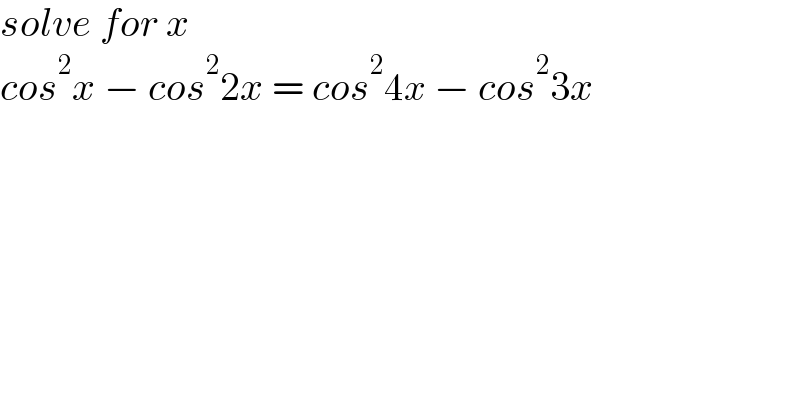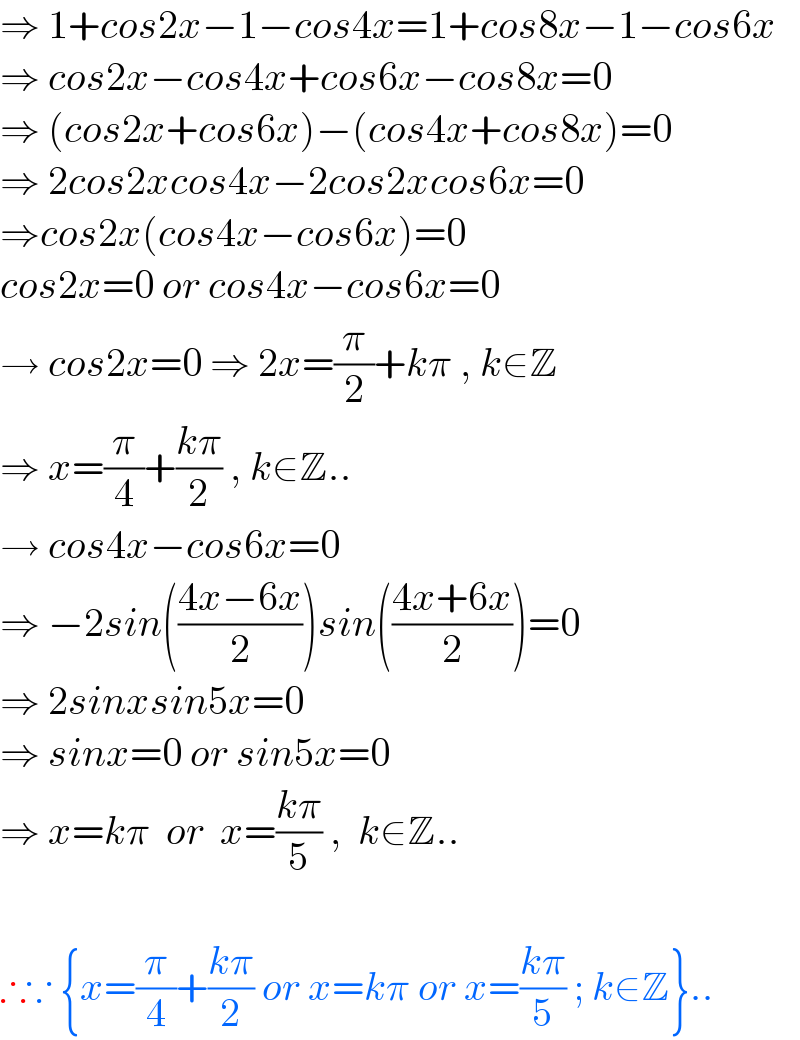
Question Number 153803 by weltr last updated on 10/Sep/21

$${solve}\:{for}\:{x} \\ $$$${cos}^{\mathrm{2}} {x}\:−\:{cos}^{\mathrm{2}} \mathrm{2}{x}\:=\:{cos}^{\mathrm{2}} \mathrm{4}{x}\:−\:{cos}^{\mathrm{2}} \mathrm{3}{x} \\ $$
Commented by Ar Brandon last updated on 10/Sep/21
![x=0[π] is a solution](Q153813.png)
$${x}=\mathrm{0}\left[\pi\right]\:\mathrm{is}\:\mathrm{a}\:\mathrm{solution} \\ $$
Answered by puissant last updated on 10/Sep/21

$$\Rightarrow\:\mathrm{1}+{cos}\mathrm{2}{x}−\mathrm{1}−{cos}\mathrm{4}{x}=\mathrm{1}+{cos}\mathrm{8}{x}−\mathrm{1}−{cos}\mathrm{6}{x} \\ $$$$\Rightarrow\:{cos}\mathrm{2}{x}−{cos}\mathrm{4}{x}+{cos}\mathrm{6}{x}−{cos}\mathrm{8}{x}=\mathrm{0} \\ $$$$\Rightarrow\:\left({cos}\mathrm{2}{x}+{cos}\mathrm{6}{x}\right)−\left({cos}\mathrm{4}{x}+{cos}\mathrm{8}{x}\right)=\mathrm{0} \\ $$$$\Rightarrow\:\mathrm{2}{cos}\mathrm{2}{xcos}\mathrm{4}{x}−\mathrm{2}{cos}\mathrm{2}{xcos}\mathrm{6}{x}=\mathrm{0} \\ $$$$\Rightarrow{cos}\mathrm{2}{x}\left({cos}\mathrm{4}{x}−{cos}\mathrm{6}{x}\right)=\mathrm{0} \\ $$$${cos}\mathrm{2}{x}=\mathrm{0}\:{or}\:{cos}\mathrm{4}{x}−{cos}\mathrm{6}{x}=\mathrm{0} \\ $$$$\rightarrow\:{cos}\mathrm{2}{x}=\mathrm{0}\:\Rightarrow\:\mathrm{2}{x}=\frac{\pi}{\mathrm{2}}+{k}\pi\:,\:{k}\in\mathbb{Z} \\ $$$$\Rightarrow\:{x}=\frac{\pi}{\mathrm{4}}+\frac{{k}\pi}{\mathrm{2}}\:,\:{k}\in\mathbb{Z}.. \\ $$$$\rightarrow\:{cos}\mathrm{4}{x}−{cos}\mathrm{6}{x}=\mathrm{0} \\ $$$$\Rightarrow\:−\mathrm{2}{sin}\left(\frac{\mathrm{4}{x}−\mathrm{6}{x}}{\mathrm{2}}\right){sin}\left(\frac{\mathrm{4}{x}+\mathrm{6}{x}}{\mathrm{2}}\right)=\mathrm{0} \\ $$$$\Rightarrow\:\mathrm{2}{sinxsin}\mathrm{5}{x}=\mathrm{0} \\ $$$$\Rightarrow\:{sinx}=\mathrm{0}\:{or}\:{sin}\mathrm{5}{x}=\mathrm{0} \\ $$$$\Rightarrow\:{x}={k}\pi\:\:{or}\:\:{x}=\frac{{k}\pi}{\mathrm{5}}\:,\:\:{k}\in\mathbb{Z}.. \\ $$$$ \\ $$$$\therefore\because\:\left\{{x}=\frac{\pi}{\mathrm{4}}+\frac{{k}\pi}{\mathrm{2}}\:{or}\:{x}={k}\pi\:{or}\:{x}=\frac{{k}\pi}{\mathrm{5}}\:;\:{k}\in\mathbb{Z}\right\}.. \\ $$
Commented by weltr last updated on 10/Sep/21

$${thank}\:{you} \\ $$
